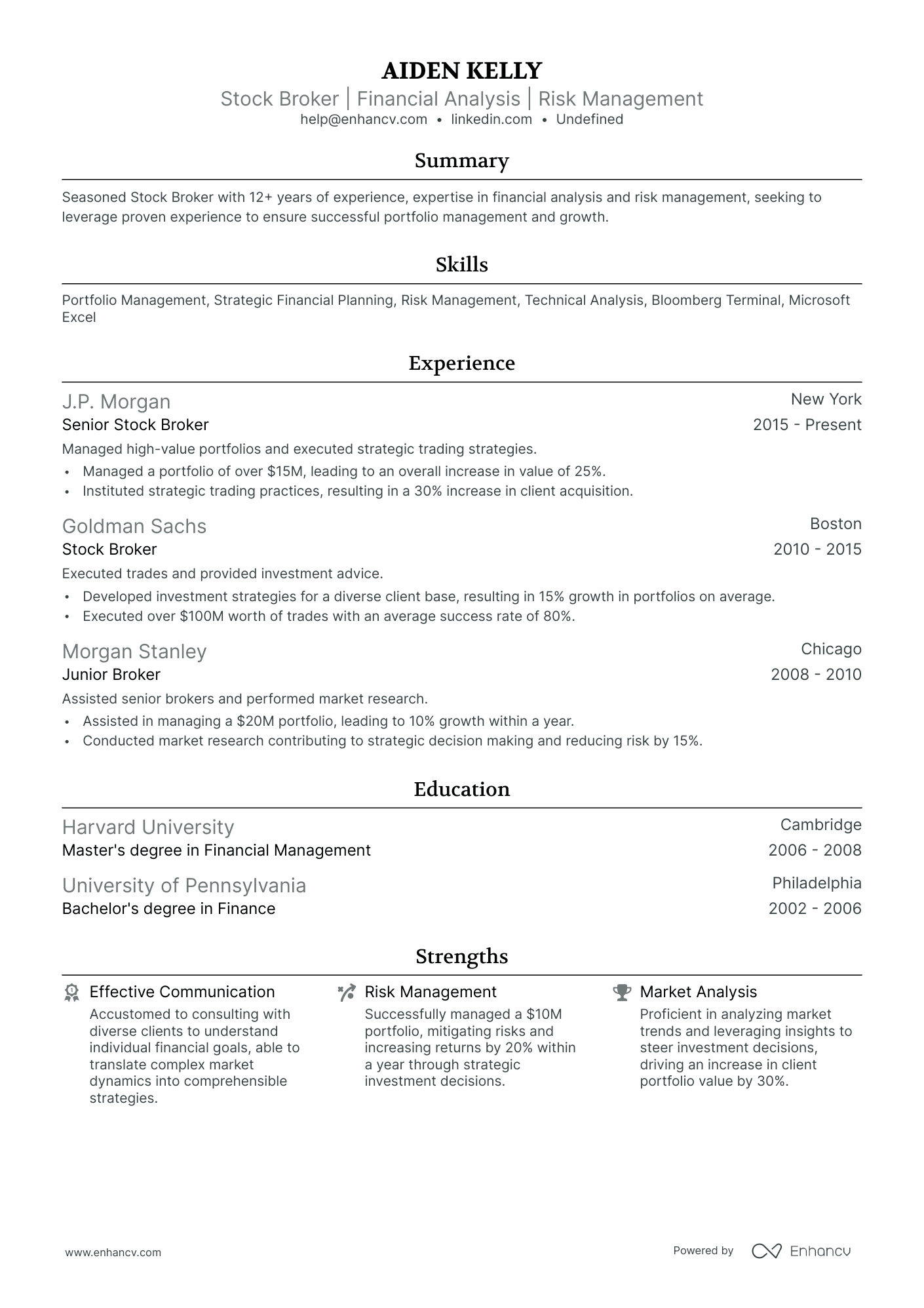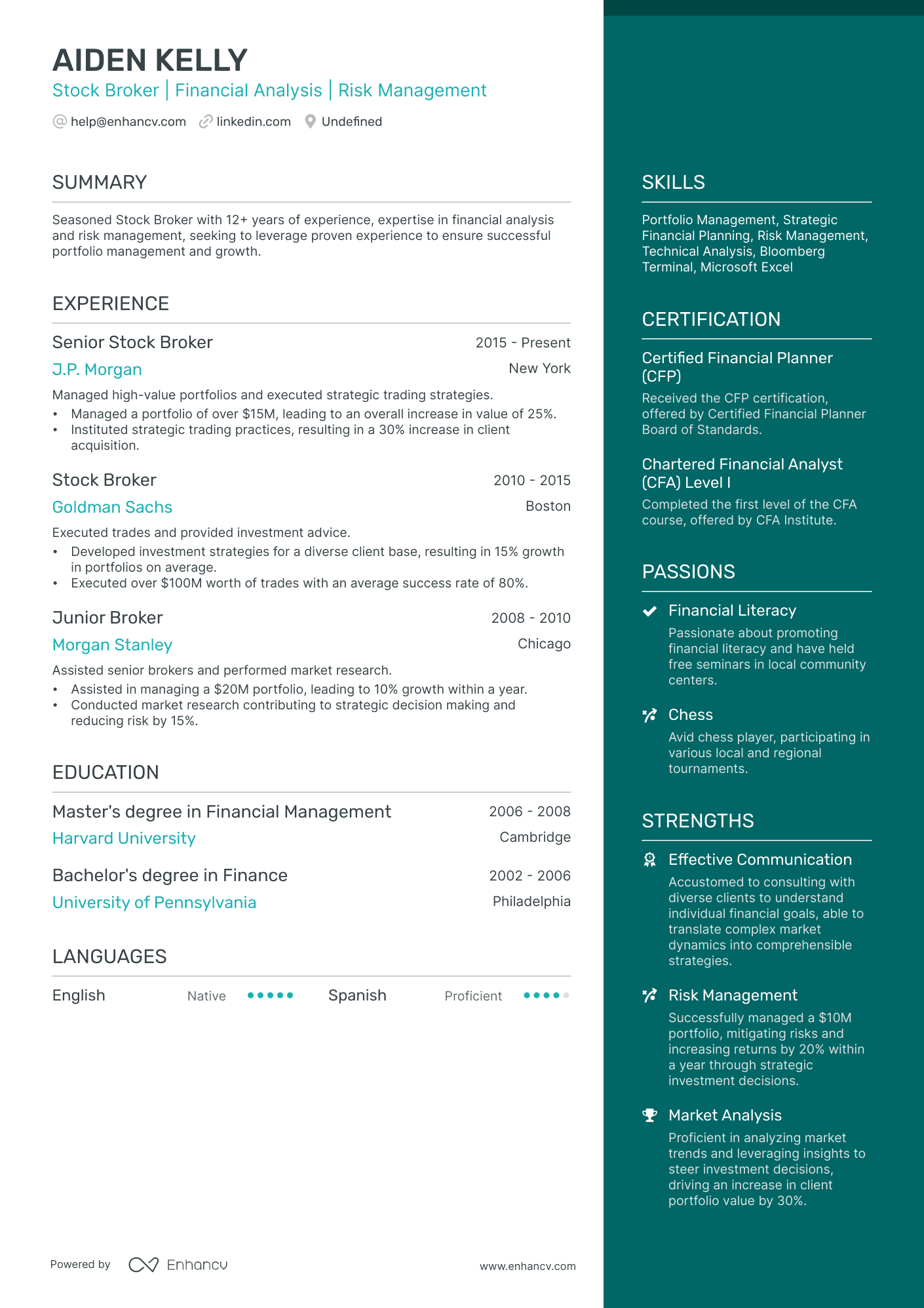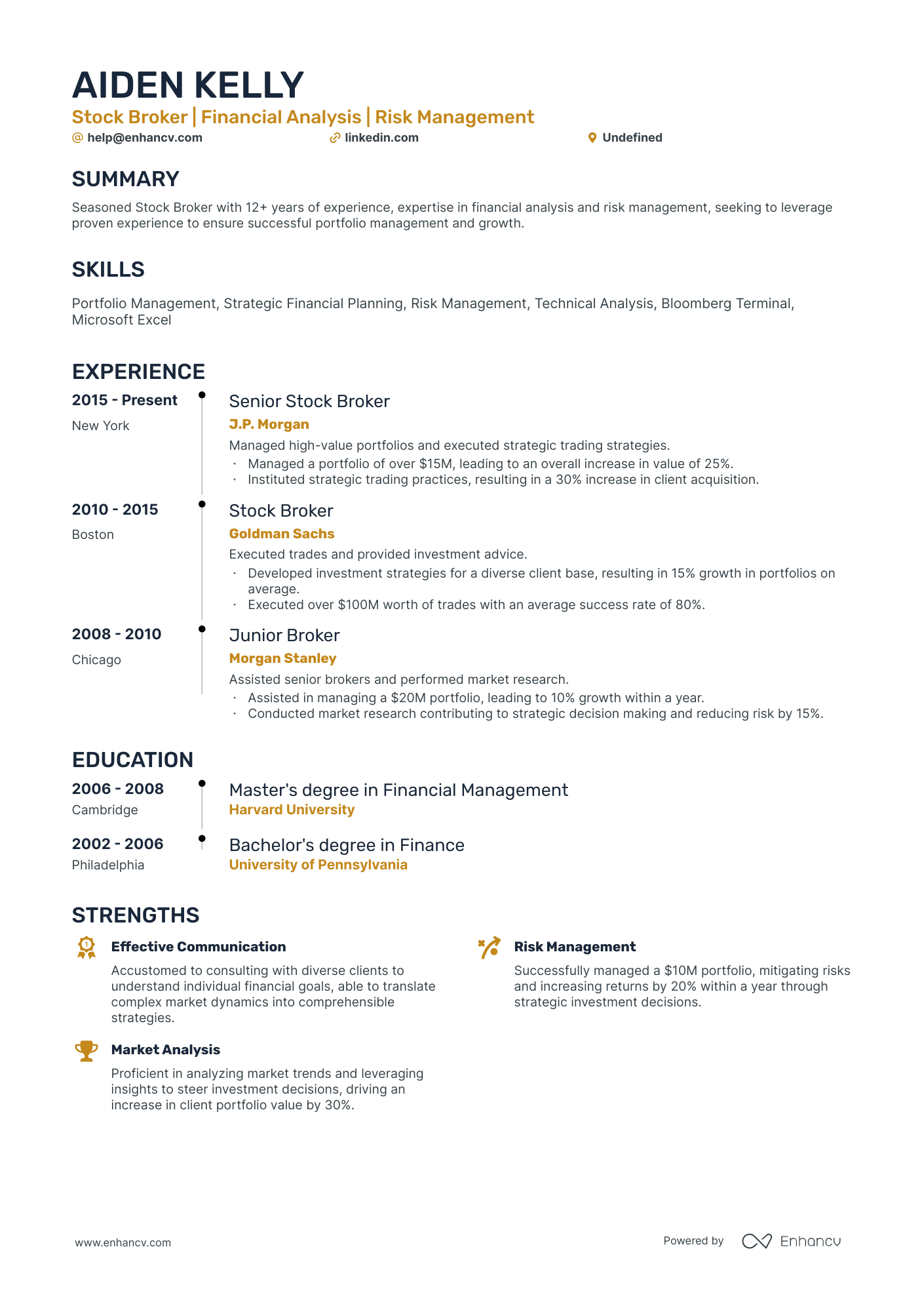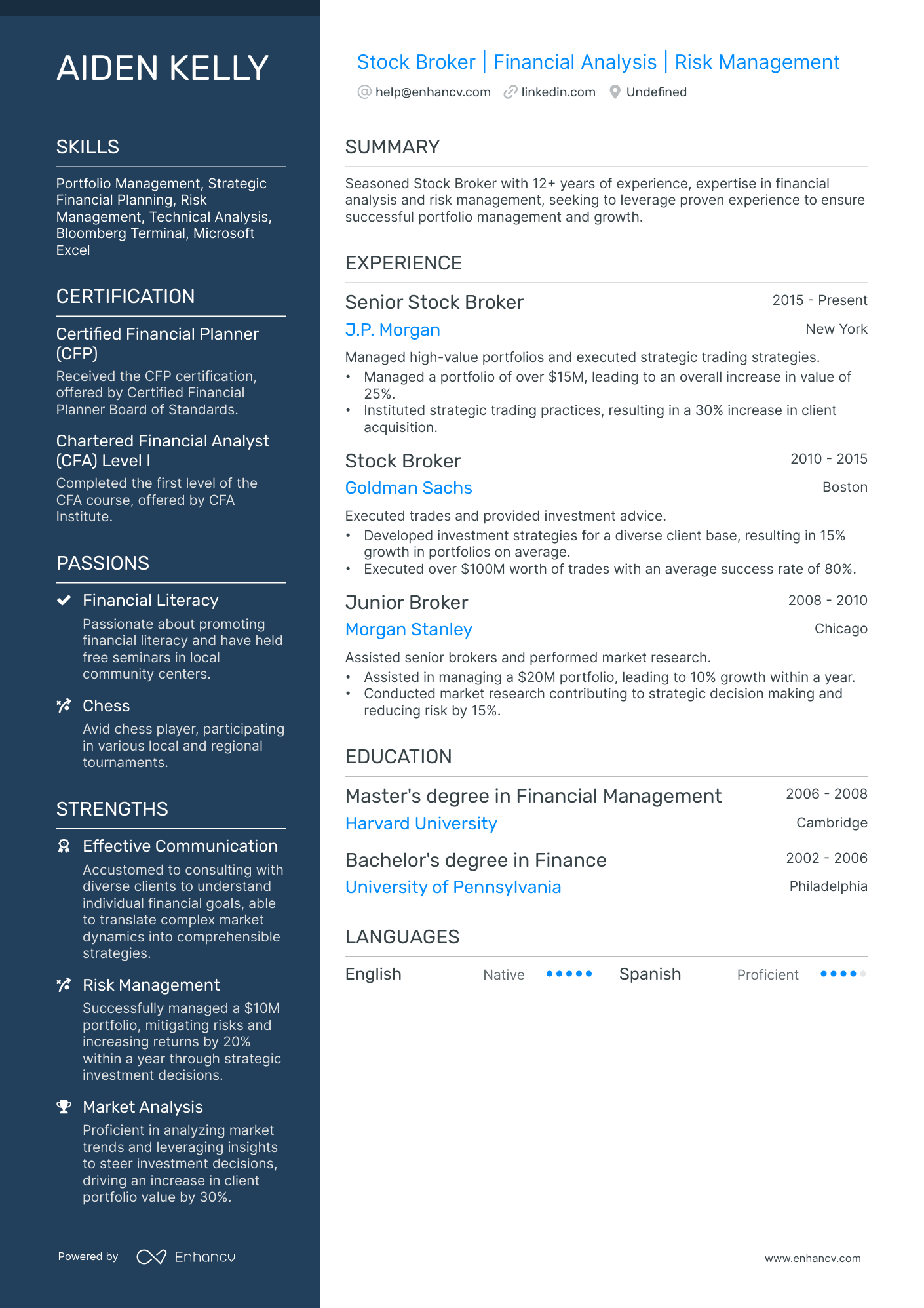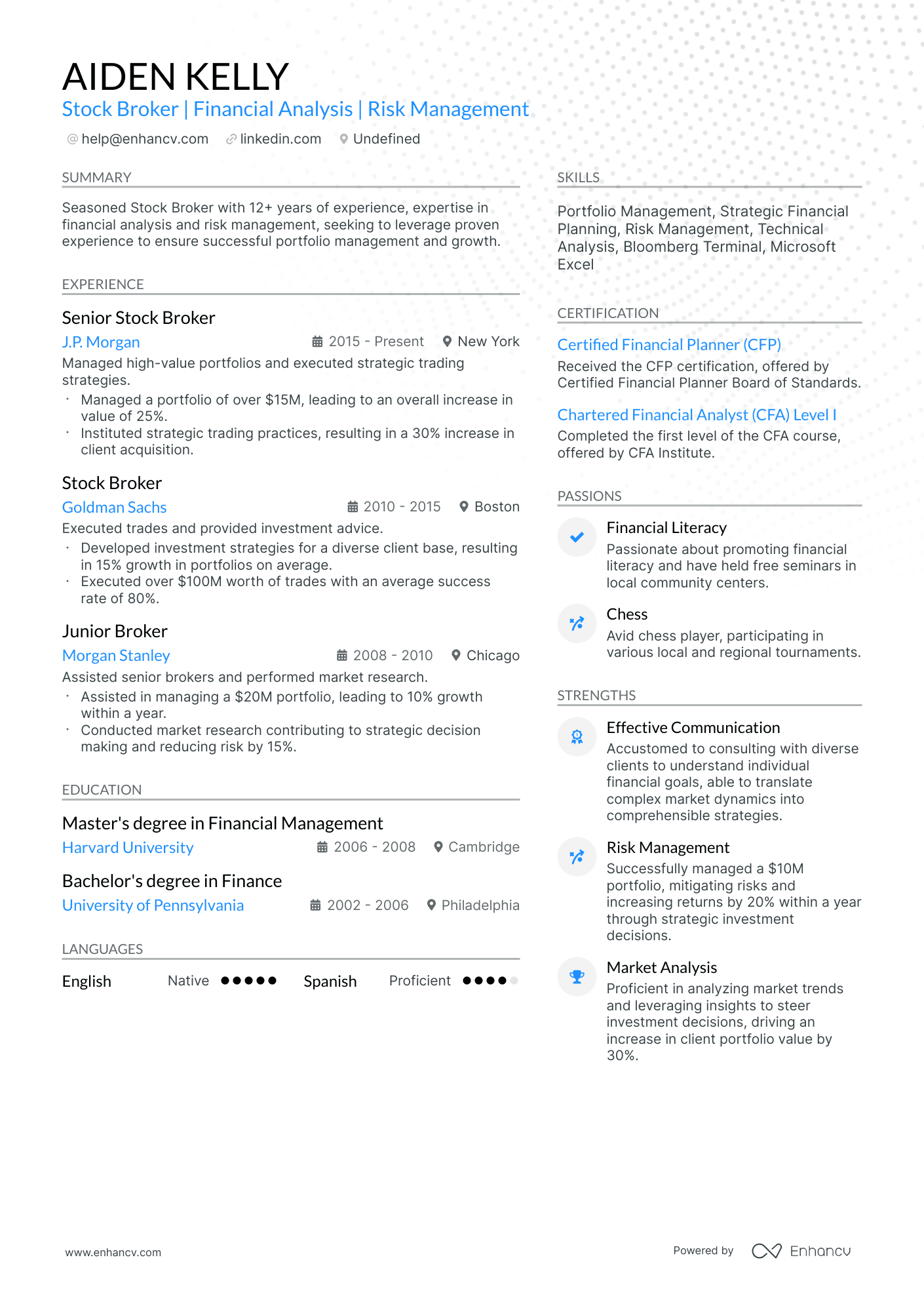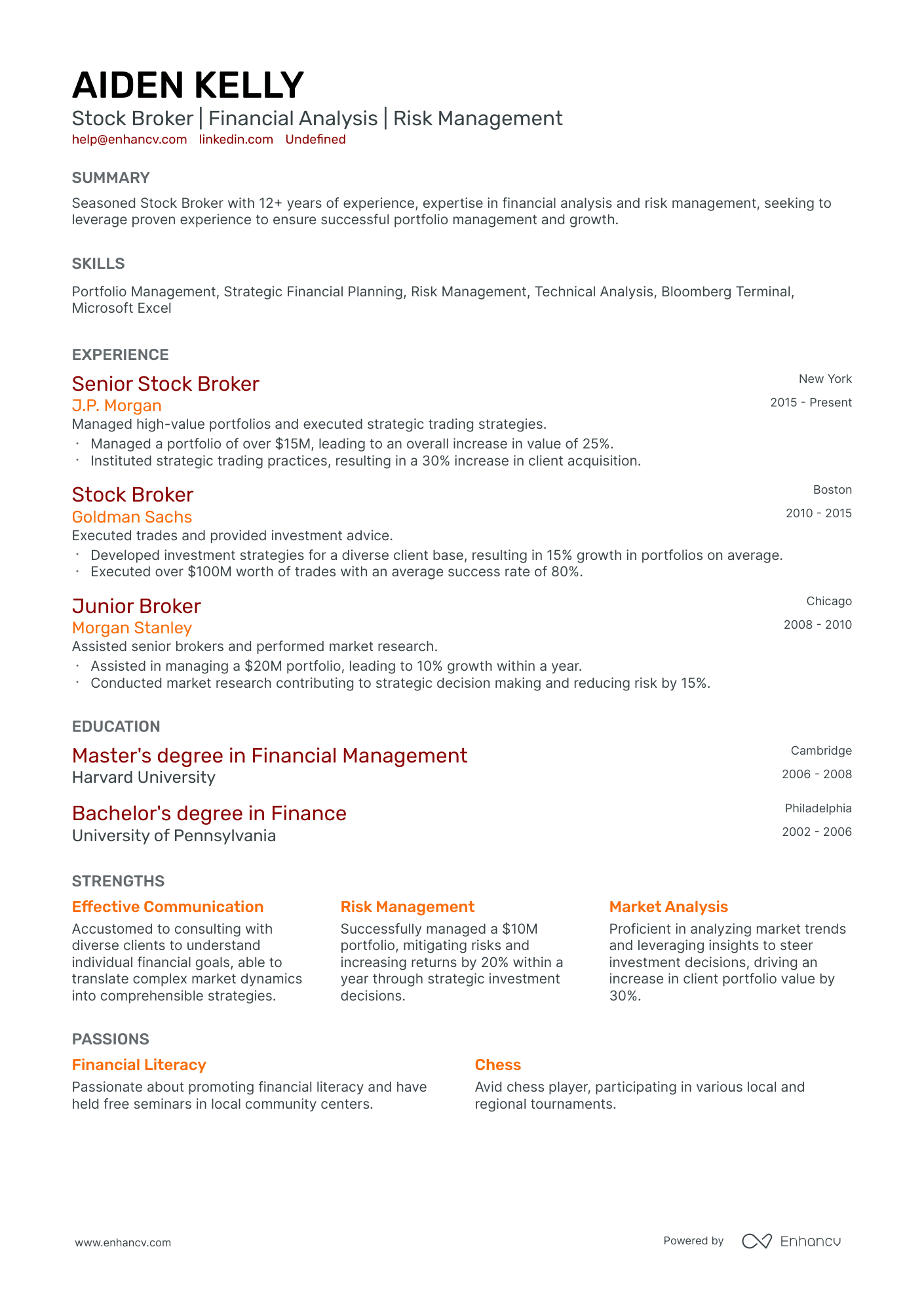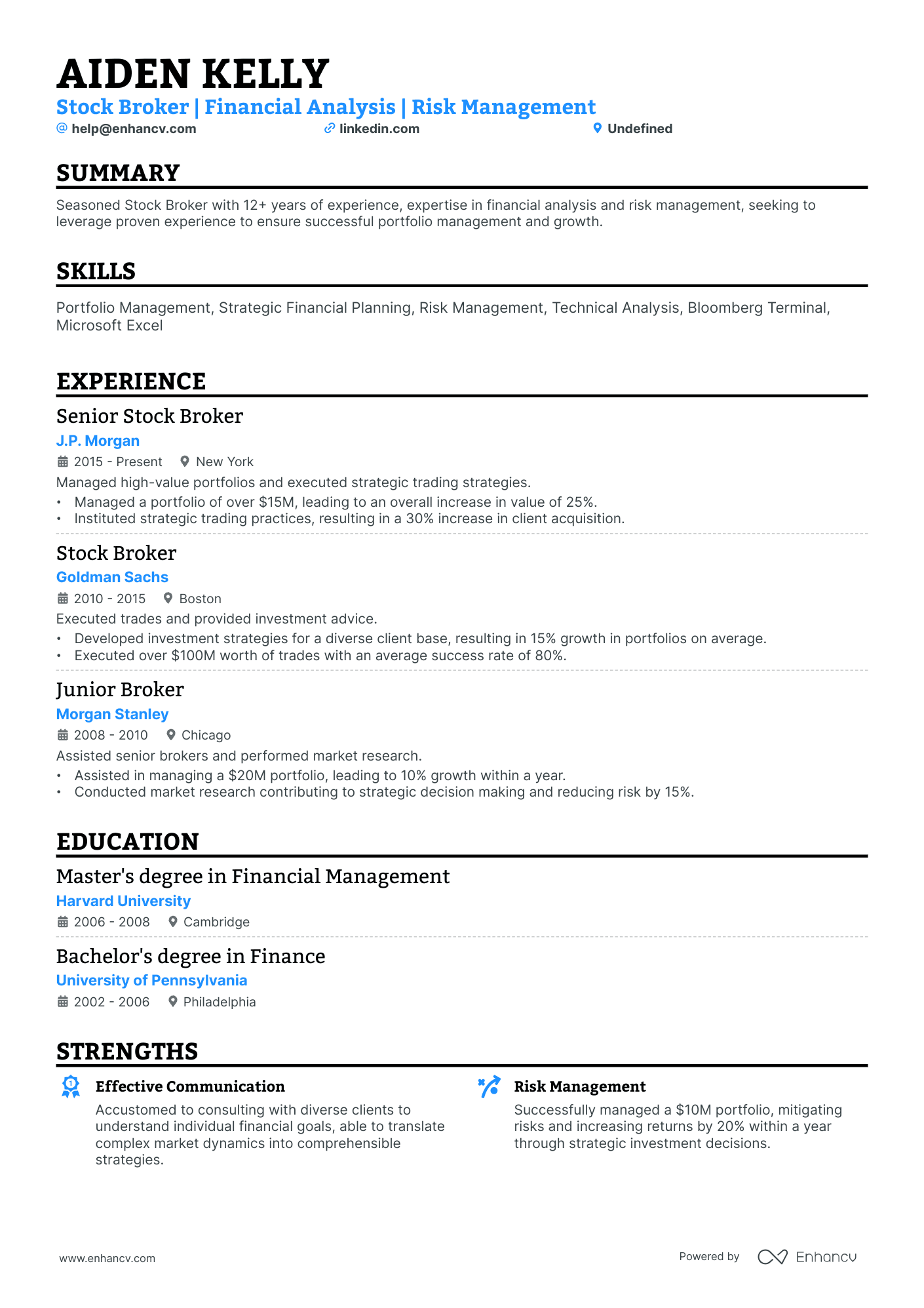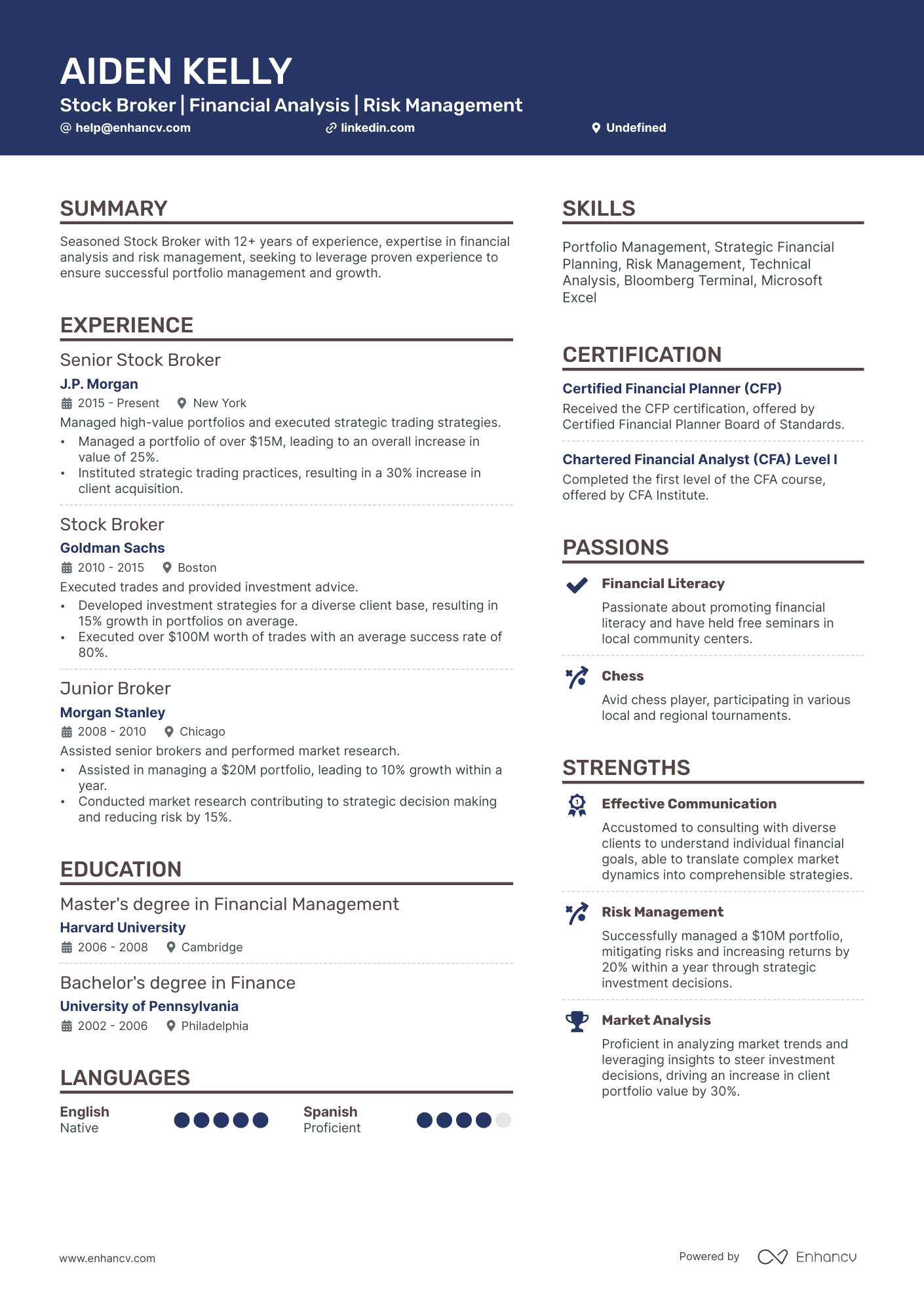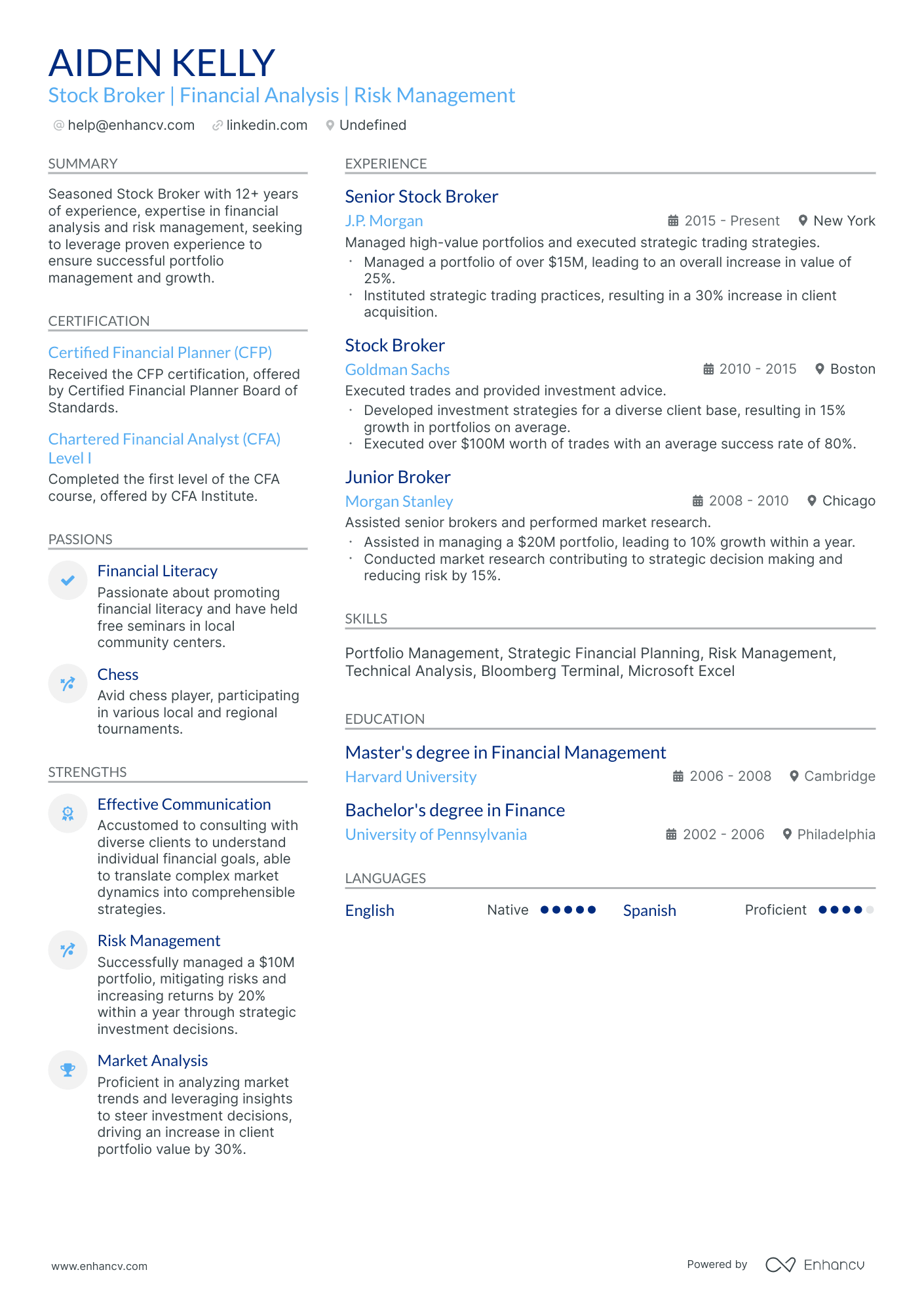One major challenge faced by stock brokers when crafting their resumes is effectively communicating their analytical skills and ability to handle high-stress situations to potential employers. Our guide can assist with this by providing industry-specific examples and tips on how to highlight these key skills and experiences in a compelling way, ensuring your resume stands out in a competitive job market.
Our stock broker guide will help you perfect your resume by explaining you how to:
- Alight your stock broker resume with the role you're applying for ensuring it will be read by the applicant tracking system.
- Tailor your specific stock broker experience to get the attention of recruiters.
- List your relevant education to impress hiring managers.
- Discover job-winning stock broker professional resume examples to inspire writing yours.
Recommended reads:
Deciphering the best format for your stock broker resume
To craft an impactful stock broker resume, start by thoroughly analyzing the job description.
Your chosen resume format should seamlessly align your experience with the role's requirements.
Consider these four pivotal elements:
- Present your experience effectively. If you boast a wealth of pertinent experience, employ the reverse-chronological resume format, listing roles by date, beginning with the most recent.
- Maintain brevity. Limit your resume to a maximum of two pages, focusing on your most salient attributes.
- Headers serve a purpose. A well-crafted header ensures recruiters can swiftly access your contact details and professional portfolio.
- Opt for PDF. Typically, submit your stock broker resume in PDF to preserve its layout. However, always adhere to specific job application guidelines.
Your resume should match the market – Canadian applications, for instance, may use a different layout.
Upload your resume
Drop your resume here or choose a file. PDF & DOCX only. Max 2MB file size.
Pro tip
At the end of the day, recruiters care most about how easily they can scan and read your resume layout. Unless you're aiming for a role in a creative field, it might be best to stick with a straightforward layout and format. Instead, put your energy into showcasing your experience.
Key sections to include in your freight broker resume are:
- The header - with your contact details (like email and phone number), a link to your portfolio, and a headline.
- The summary (or objective) - highlighting the high points of your career so far.
- The experience section - limit yourself to six bullets per role to focus on specific results.
- The skills list - offering a balanced mix of your personal and professional talents.
- Education and certification - displaying your most relevant degrees and certificates for the freight broker role.
What recruiters want to see on your resume:
- Financial Acumen: Deep understanding of financial markets, investment strategies, and regulations.
- Quantitative Skills: Proficiency in mathematical analysis, forecasting market trends, and statistical reporting.
- Sales Skills: Proven track record of sales success, ability to build relationships with clients, and negotiating deals.
- Certifications: Relevant licenses such as Series 7 and Series 63 from the Financial Industry Regulatory Authority (FINRA).
- Technological Competency: Mastery of brokerage software and platforms, trading systems, and familiarity with AI/machine learning applications in finance.
Recommended reads:
The experience section of your stock broker resume: your professional journey
The experience section is your platform to narrate your professional story. Recruiters scrutinize this section to gauge your unique value proposition.
Here are five steps to craft a compelling experience section:
- Highlight relevant roles, including the company, role description, and tenure, supported by up to six bullet points per role.
- Emphasize tangible outcomes of your contributions, using quantifiable metrics where possible.
- Integrate positive feedback or endorsements to bolster your claims.
- Ensure verb tense consistency when detailing responsibilities.
- Summarize significant achievements relevant to each role.
Explore how seasoned stock broker professionals have crafted their experience sections to secure roles at industry-leading firms.
- Conducted thorough research and analysis of market trends, resulting in accurate investment recommendations for clients.
- Managed a diverse portfolio of high-net-worth clients, achieving an average annual return of 15%.
- Collaborated with a team of analysts to develop and implement customized investment strategies tailored to individual client goals.
- Executed buy and sell orders for stocks, bonds, and other securities on behalf of clients, ensuring timely and efficient transactions.
- Provided comprehensive financial advice to clients regarding retirement planning, tax optimization, and risk management.
- Developed and maintained relationships with institutional clients, resulting in a 30% increase in assets under management.
- Analyzed market data and economic indicators to identify emerging investment opportunities for clients.
- Implemented algorithmic trading strategies to optimize trade execution and enhance portfolio performance.
- Led a team of junior brokers, providing training and guidance to support their professional development.
- Created detailed investment reports for clients, highlighting portfolio performance and recommending adjustments.
- Advised clients on alternative investment options, such as real estate and private equity, diversifying their portfolios and mitigating risk.
- Utilized advanced technical analysis tools and models to identify short-term trading opportunities in volatile markets.
- Collaborated with the research team to identify undervalued stocks and presented investment recommendations to clients.
- Implemented automated trading systems, improving efficiency and reducing execution time by 20%.
- Participated in IPO processes, conducting due diligence and evaluating investment prospects for clients.
- Developed and executed strategic marketing campaigns to attract new clients, resulting in a 25% increase in client base.
- Provided real-time market analysis to clients, assisting them in making informed investment decisions.
- Utilized options trading strategies to hedge risk and maximize returns for clients.
- Collaborated with portfolio managers to rebalance client portfolios based on changing market conditions.
- Conducted seminars and workshops on investment strategies and financial planning for potential clients.
- Developed and implemented an online trading platform, increasing client engagement and expanding the firm's reach.
- Provided personalized advice to clients through video conferencing, leveraging technology to deliver remote financial services.
- Managed a team of brokers, ensuring compliance with industry regulations and maintaining high-quality customer service.
- Implemented machine learning algorithms to analyze market data and predict stock price movements with 80% accuracy.
- Collaborated with the marketing team to develop targeted campaigns and attract a younger demographic of investors.
- Conducted in-depth fundamental analysis of companies, evaluating financial statements and assessing investment opportunities.
- Developed and maintained relationships with institutional clients, resulting in a 40% increase in assets under management.
- Executed high-frequency trades using proprietary trading software, optimizing trade execution speed and minimizing slippage.
- Provided real-time market commentary to media outlets, establishing the firm as a trusted source of financial expertise.
- Managed risk by implementing stop-loss orders and diversifying portfolios across different sectors and asset classes.
- Developed and implemented investment strategies aligned with sustainable and socially responsible investing principles.
- Advised clients on the potential impact of ESG factors on their portfolios, integrating environmental and social criteria into investment decisions.
- Collaborated with research analysts to identify companies with strong ESG performance, resulting in outperformance of benchmark indices.
- Presented at industry conferences on the importance of sustainable investing and its long-term benefits.
- Engaged with clients through regular communication and educational webinars to promote responsible investment practices.
- Analyzed macroeconomic indicators and geopolitical events to assess their impact on global financial markets.
- Specialized in emerging markets, providing investment recommendations to clients seeking exposure to high-growth economies.
- Implemented derivative strategies, such as options and futures, to hedge risk and enhance portfolio returns.
- Developed and presented investment seminars for high-net-worth clients, focusing on international diversification.
- Utilized technical analysis tools and chart patterns to identify entry and exit points for profitable trades.
- Managed a team of brokers, overseeing their daily activities and providing guidance on complex financial transactions.
- Implemented algorithmic trading strategies, optimizing trade execution and reducing transaction costs by 15%.
- Developed and maintained relationships with institutional clients, resulting in a 20% increase in assets under management.
- Conducted market research and due diligence on potential investment opportunities across various sectors.
- Provided financial education workshops for corporate clients, covering topics such as employee stock options and retirement planning.
- Executed trades on behalf of clients, ensuring accurate and timely order placement.
- Provided investment advice to retail clients, tailoring recommendations based on their risk tolerance and investment objectives.
- Monitored portfolio performance and conducted regular reviews with clients to discuss strategy adjustments.
- Collaborated with the compliance team to ensure adherence to regulatory guidelines and industry best practices.
- Assisted in the development and implementation of a client relationship management system, improving efficiency and customer satisfaction.
The following content includes information from "O*NET OnLine" by the U.S. Department of Labor, Employment and Training Administration (USDOL/ETA). Used under the CC BY 4.0 license. The data represents the top responsibilities present on the task lists for stock broker professionals.
Top Responsibilities for Stock Broker:
- Make bids or offers to buy or sell securities.
- Monitor markets or positions.
- Agree on buying or selling prices at optimal levels for clients.
- Keep accurate records of transactions.
- Buy or sell stocks, bonds, commodity futures, foreign currencies, or other securities on behalf of investment dealers.
- Complete sales order tickets and submit for processing of client-requested transactions.
- Report all positions or trading results.
- Interview clients to determine clients' assets, liabilities, cash flow, insurance coverage, tax status, or financial objectives.
- Discuss financial options with clients and keep them informed about transactions.
- Identify opportunities or develop channels for purchase or sale of securities or commodities.
Quantifying impact on your resume
<ul>
Addressing a lack of relevant stock broker experience
Even if you lack direct stock broker experience, you can still craft a compelling resume. Here's how:
- Highlight projects or publications that demonstrate your relevant skills or knowledge.
- Emphasize transferable skills, showcasing your adaptability and eagerness to learn.
- In your objective, outline your career aspirations and how they align with the company's goals.
- Consider a functional or hybrid resume format, focusing on skills over chronological experience.
Recommended reads:
Pro tip
The experience section is all about relevancy to the stock broker role. Decide on items that will show your expertise and skills in the best possible light.
Stock broker resume skills: showcasing both hard and soft skills
Your stock broker resume should show recruiters your range of skills. List the tools and software you use (hard skills) and how they fit into your daily tasks. But don't stop there. Share the personal traits (soft skills) you've gained from your experiences. Here's how:
- Showcase three top career achievements.
- For each achievement, mention a hard and a soft skill you used.
- Highlight unique skills that set you apart.
- Discuss how your skills improved the workplace or team culture.
Check our list for popular hard and soft skills in the industry.
Top skills for your stock broker resume:
Financial Modeling
Technical Analysis Software
Trading Platforms (e.g., E*TRADE, TD Ameritrade)
Excel for Financial Analysis
Risk Management Tools
Bloomberg Terminal
Market Research Tools
Statistical Analysis Software
Portfolio Management Systems
Charting Software
Analytical Thinking
Communication Skills
Attention to Detail
Negotiation Skills
Time Management
Problem-Solving
Interpersonal Skills
Stress Management
Decision-Making
Adaptability
Next, you will find information on the top technologies for stock broker professonals from "O*NET OnLine" by the U.S. Department of Labor, Employment and Training Administration (USDOL/ETA). Used under the CC BY 4.0 license.
Top technologies for Stock Broker’s resume:
- Oracle PeopleSoft
- SAP software
- Microsoft PowerPoint
- Oracle E-Business Suite Financials
- Web-based trading systems
Pro tip
When detailing your skills, align them with the job's requirements. Emphasize unique technical proficiencies and provide examples of your soft skills in action.
Highlighting stock broker-specific certifications and education
Your resume education section can be a treasure trove of skills and experiences relevant to the role. Here are the best practices when it comes to featuring it on your resume:
- Highlight advanced qualifications, detailing the institution and duration.
- If you're currently pursuing a degree, mention your expected graduation date.
- Consider omitting unrelated degrees.
- If your academic journey boasts significant achievements, especially in research, elaborate on them.
What's more, shocasing relevant industry certifications can bolster your credibility, even if you lack extensive work experience.
To effectively present your certifications:
- Place pivotal industry certifications prominently in a dedicated section.
- If a certification is particularly impressive, consider featuring it near your name or within the header, summary, or objective.
- Provide details, where relevant, to underscore alignment with the role.
- Recent certifications should be given advantage, as they show your up-to-date knowledge.
Both education and certification sections highlight your commitment to professional growth, a trait valued by employers. Below, explore some of the most current and sought-after stock broker certifications to enhance your application:
Best certifications to list on your resume
- Chartered Financial Analyst (CFA) - CFA Institute
- General Securities Representative Exam (Series 7) - FINRA
- Uniform Securities Agent State Law Examination (Series 63) - FINRA
- Certified Financial Planner (CFP) - CFP Board
- Uniform Investment Adviser Law Exam (Series 65) - FINRA
- General Securities Principal Exam (Series 24) - FINRA
- Securities Industry Essentials (SIE) Exam - SIFMA
- Certified Anti-Money Laundering Specialist (CAMS) - Association of Certified Anti-Money Laundering Specialists (ACAMS)
Pro tip
If you're in the process of obtaining a certification listed in the job requirements but haven't completed it yet, be transparent. Mention your ongoing training and the expected completion date. Honesty is always the best policy on a resume.
Recommended reads:
Deciding between a stock broker resume summary or objective
While some argue the resume summary or objective is outdated, these sections can effectively:
- Integrate pivotal stock broker keywords.
- Showcase your achievements.
- Clarify your motivation for applying.
The distinction lies in their focus:
- A resume objective emphasizes your career aspirations.
- A resume summary spotlights your career milestones.
Opt for a summary if you have a rich experience you wish to highlight immediately. Conversely, an objective can be ideal for those wanting to underscore their aspirations and soft skills.
For inspiration, we've curated samples from industry professionals to guide your resume summary or objective crafting:
Resume summary and objective examples for a stock broker resume
Seasoned stock broker with 10+ years of experience in the financial industry, boasting an impressive track record in portfolio management and client relationship building. Expertise in technical analysis, charting, and options trading contributed to a consistent increase in client portfolio values by 15-20% annually.
Pioneering technologist turned stock broker with 3 years' worth of experience in AI-based algorithmic trading. Leveraged strong analytical skills from previous engineering background, resulting in over $5M in savings through improved trade executions. Skilled in Python for financial modeling and risk assessment.
Certified financial advisor with 15 years' experience, seeking to transition into the realm of stock brokering. Demonstrated success in asset allocation strategies and retirement planning, with a proven ability to meet stringent regulatory compliance requirements. Proficient in using Bloomberg Terminal for market data analysis.
Former investment banker with 7 years' experience aiming to leverage extensive knowledge in equity research and IPOs into a successful career as a stock broker. Proven ability to negotiate complex deals and transform market insights into profitable investment opportunities. Mastery of FINRA regulations and Series 7 and 63 licenses.
A fresh graduate with a major in Finance and minor in Computer Science, eager to embark on a stock broker career. Outstanding academic performer with comprehensive understanding of financial markets and trading principles. Adept at utilizing quantitative methods and machine learning techniques for predictive modeling.
An MBA graduate looking to utilize robust educational background in finance and keen interest in capital markets to start a career as a stock broker. Exceptionally skilled in statistical analysis, economic forecasting and strategic financial planning. Dedicated to making informed decisions that maximize investor returns.
Optimize your resume summary and objective for ATS
Drop your resume here or choose a file.
PDF & DOCX only. Max 2MB file size.
Extra sections to include in your stock broker resume
What should you do if you happen to have some space left on your resume, and want to highlight other aspects of your profile that you deem are relevant to the role?
Add to your stock broker resume some of these personal and professional sections:
- Passions/Interests - to detail how you spend both your personal and professional time, invested in various hobbies;
- Awards - to present those niche accolades that make your experience unique;
- Publications - an excellent choice for professionals, who have just graduated from university or are used to a more academic setting;
- < a href="https://enhancv.com/blog/volunteering-on-resume/"> Volunteering - your footprint within your local (or national/ international) community.
Key takeaways
- Craft a stock broker resume that's easy to read and aligns with the role's requirements.
- The top third of your resume should clearly convey your unique value proposition for the stock broker role.
- Tailor your resume to the job, highlighting skills, achievements, and the tangible results of your efforts.
- Detail your certifications and technical skills to demonstrate proficiency with specific tools and technologies.
- The sections you choose should collectively present a comprehensive view of your professional expertise and personality.
